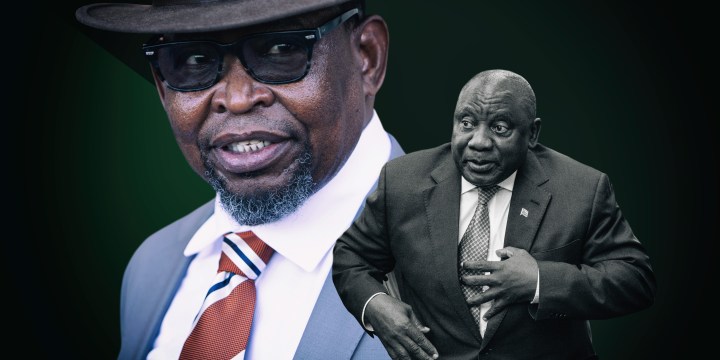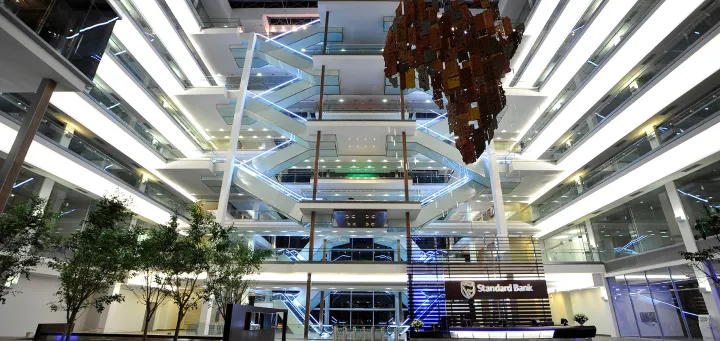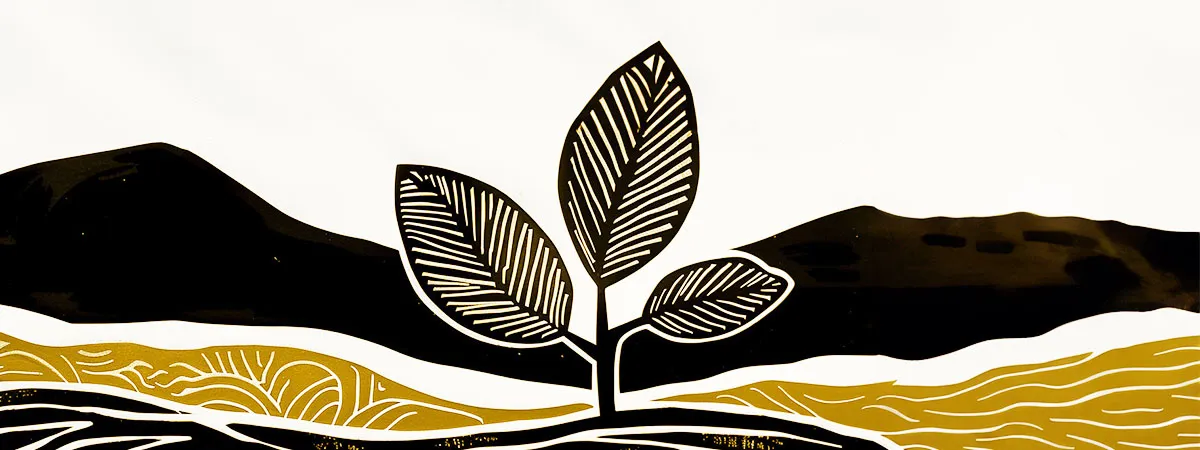MEDIUM-TERM BUDGET POLICY STATEMENT OP-ED
Treasury has been bent to Ramaphosa’s populist agenda — the consequences will be dire

The hard numbers won’t go away. Instead of shrinking, they will grow and unless there is a dramatic change in direction, they will overwhelm the fiscus. The private sector has been vocal in its warnings. Eventually, the country will run out of other people’s money.
Governance is not a spectator sport. It requires identifying moments of crisis and acting swiftly and convincingly to deal with them.
One such moment has come and gone with little more than a murmur from Finance Minister Enoch Godongwana as he delivered the Medium-Term Budget Policy Statement.
Instead of acting decisively, he delayed and prevaricated, further contributing to the populist drift which is undermining confidence in the government’s ability to make and execute tough decisions.
The problem is plain enough and, like a good spectator, Godongwana delivered them to the nation in an appropriately sombre tone. Tax revenues are down as South Africa’s corporate sector continues to choke on abysmal energy provision and failing logistics while policy uncertainty and new regulations choke new investment.
On top of this, the government buckled to public service unions by awarding an unbudgeted salary increase, the consequences of which are a R24-billion hit this year, compounding to R74-billion over the medium term.
And, because of these failings, borrowing is rising. According to Godongwana, the government will borrow a staggering R553-billion a year over the medium term. Gross debt is set to rise from R4.8-trillion to R5.2-trillion over the next financial year, punching through the R6-trillion level by 2025/26.
Debt service costs will rise to 22.1% of revenue by 2026/27.
Annual interest on debt will amount to R385.9-billion. That means the country will be paying R1.057-billion a day to creditors, or R17 a day for each of South Africa’s 62 million citizens. While the President is quick to laud how the social grants system has helped to stave off the worst effects of poverty — even though it is failing to graduate people out of poverty altogether — the cost of this social protection is just R10 per citizen per day.
Essentially, South Africa’s extremely poor and vulnerable are subsiding the spending habits of the civil service.
The government sits tight
You would think it would be all hands to the pump as South Africa takes on water with a fiscal cliff — or perhaps waterfall — looming.
Instead, the government has decided to sit tight, announcing no dramatic new cost-cutting for the state and holding on to populist policies that are bleeding the fiscus dry.
Godongwana said, “Action is being taken to review and reconfigure the structure and size of the state, in line with the President’s commitment in the 2023 State of the Nation Address.
“A joint plan to review government departments, entities and programmes over the next three years is being prepared.”
Sorry sir, but the old “review” mirror trick doesn’t cut it any more. The State of the Nation Address was made in February; it is now October. The review should be long over and we should be hearing about the actions that have been implemented and their results.
But cutting spending on the civil service means offending the hundreds of thousands of comrades who have been deployed there, many without the requisite qualifications and with no hope of landing an equivalent job in the private sector, which does not have the luxury of carrying passengers. The Zondo Commission spelt out clearly how poisonous cadre deployment has been, but President Cyril Ramaphosa and the ANC elite have continued to defend it.
A “committee to investigate” just does not cut it. Nor does this: “We propose a strategy of spending adjustments based on policy priorities, and a reconfiguration and rationalisation of the state, which includes closing or merging ineffective entities and programmes, and enhancing the complementarity of its functions.”
Each of these “ineffective entities and programmes” is an income opportunity for a cadre and these turkeys will never vote for Christmas.
Here’s another rhetorical gem: “We also consider that additional measures to anchor fiscal policy and maintain confidence need to be investigated. Work is under way in this regard and an update will be provided at the time of the Budget Review.” Translation: “Some guys are going to drag themselves to meetings where they will postpone decisions on the problem.”
Godongwana’s plans stymied
You do have to feel some sympathy for Godongwana. A month and a bit ago, probably while he was finalising this speech and digesting the terrible numbers, he tried to act.
The Treasury wrote a letter to all levels of government, ordering the suspension of hiring and of the awarding of procurement contracts for all infrastructure projects.
No sooner had he spoken than Ramaphosa — acting with rare speed — convened a meeting on a wine farm outside Stellenbosch with Godongwana, Reserve Bank Governor Lesetja Kganyago and other Treasury officials to head this project off at the pass.
A week later, he had to suffer a humiliating put-down by a junior as Minister in the Presidency Khumbudzo Ntshavheni announced after a Cabinet meeting that guidelines would be issued to “clarify the unintended misunderstanding” arising from the cost-containment letter. Godongwana got the memo: No finance minister can stand in the way of jobs-for-pals and, horror of horrors, stop the flood of money from procurement.
Herein lies a reminder of the key structural problem facing the African National Congress and its alliance partners. Even when it knows what it has to do to reform the country, the interests of its constituents won’t allow for it to occur. And so the country consistently fails to match actions with rhetoric, whether this is over the concessioning of rail and ports, reducing the wage bill, or making it easier for the private sector to fire (and thus hire).
But the hard numbers won’t go away. Instead of shrinking, they will grow and unless there is a dramatic change in direction, they will overwhelm the fiscus. The private sector has been vocal in its warnings. Eventually, the country will run out of other people’s money.
In the words of Busa’s CEO, Cas Coovadia, quoted in Business Day, clear measures are needed to cut spending “which has to include deep and substantial cuts in spending on non-essential and non-productive programmes, the shelving of unfunded prestige projects and linking future public sector wage increases to inflation”.
Coovadia, a former head of the Banking Association of SA and of the International Banking Federation, is probably more acutely aware of the looming fiscal crisis than most.
“These measures must have the support of the rest of the Cabinet, which must speak with one voice to boost public confidence in the government’s commitment to responsible management of the economy,” he said.
“SA has a growing tax revenue shortfall, in part because of weak household finances, low business confidence, low investment, lower global commodity prices and a weak rand.”
Ramaphosa appears to disagree. He thinks a committee of cadres can talk their way out of this one. Whether they can depends on what voters think and do. DM
Greg Mills and Ray Hartley work for The Brenthurst Foundation.


















This article is a timely reminder of the dangers of falling over that fiscal cliff, and the extreme difficulty of bouncing back once this has happened.
It also clearly illustrates that South Africa, indeed the whole of Africa is nowhere near mature enough to handle the responsibilities of Democracy.
This should give us all pause to deeply reflect, because once we fall into that abyss, and that is no longer sometime in the distant future, but rather, the next month few months. We collectively can no longer afford Mr Ditherer as President.
The reality is that we have a complete fraudster and impostor as president, and an utter spineless/useless nincompoop, who acts as if he is the modern day Kissinger, strutting his vacuous nonsense on the world stage whilst SA burns. This vile and treasonous anc has done so much damage and destruction to this country in their corrupt, inept, criminal, predatory and failed socialist/communist dogma ways that only a clean sweep of these lecherous and thieving cowards and cadres will give this long-suffering and highly-abused populace a chance for a better life and country.
The book “The History of Central Banking and the Enslavement of Mankind” by Stephen Goodson should be read by anyone interested in understanding why we are here in this situation today. According to Goodson, the SARB is the problem because it is privately owned and charges interest on the money it prints. The interest is the problem. This is usury. The solution? The state/people should be in charge of its own currency/money supply and should NOT be charging interest. Without interest being charged there would be no inflation, no poverty and no debt. Now I’m not a financial fundi by any means so I leave it to the financial people to discuss the above. But PLEASE don’t dismiss this out of hand!! Thank you!
I agree. Ever since the concept of interest appeared on the scene we have gone backwards. Interest is a concept invented by the rich to exploit the working class. How can you finacially reward someone just for the sake of having lots of money?
What utter nonsense! Sorry, I know you asked this not to be rejected out of hand, but the consequences need a whole dissertation.
I know there will be two sides to this issue (maybe more!) but the capture of the world’s financial system by certain people is not unknown to anyone who digs a bit deeper. What is for sure though is that the concept of interest-free money is not “utter nonsense” and I would truly appreciate a more detailed argument against interest-free money. Thank you!
Go for it if you think you can pay off your purchase in full before the promotional period ends. However, if you think there’s a chance that you won’t be able to pay off the balance on time, avoid interest-free offers at all costs (unless, of course, you enjoy throwing your money away).
What complete and utter rubbish, interest does not keep people poor, people do! In our case those people reside in Parliment and councils around the country proffessing to serve the ANC and the people of South Africa, when in truth they serve nothing but their own narrow interests. A prosperous well educated population is not in the best intrests of the ANC as that population would not put up with them for 1 minute.
It’s in one of Niall Fergusson’s books where he talks about the magic of compound interest. Interest charged is the risk insurance. When a defaulter loses his borrowed money and cannot redeem the debt the lender also loses. The risk insurance from all debtors is the lenders protection. If the government starts giving out interest-free loans, God help us (it’s called social grants) BTW and its borrowed money.
I have to disagree with you on this point. Interest is a risk premium that is charged for the willingness to lend money to a borrower. The lender adjusts the premium based on the lenders ability to repay the loan.
Can you imagine how the system would work risk free. Only in the fantasy world of socialism would this even be suggested.
A noble idea but impractical.
About interest. Let’s keep it simple. If you owned a tractor and I asked you to use it to plow my land for me, would you not expect compensation? Same thing for money.
I hope you didn’t pay good money for that book by that author; hopefully it was just a bad buy or a R10 contribution at a charity old books stall.
It’s generally a good idea to be curious when one comes across a book that throws out all practices that have developed over hundreds of years and for good reasons.
So, read widely and deeply and find all other research with different understandings on a very interesting topic.
Then think about what you’ve discovered.
Give it a try and then you will probably realise just how insane your contribution here is.
That said, also be more curious of the writers- then you would’ve found out that Mr Goodson was an admirer of Hitler, a holocaust denialist and a WW2 revisionist – all that before he bent the ear of our thoroughly discredited & impeached former Public Protector Mkhwebane, with her derailed attempt to scupper the SARB with her 2017 report.
Best of luck and happy readings.
Thanks Pet Bug, I am a very curious reader so I urge anyone who reads my posts to not read anything into them other than being curious. I have no allegiance to any specific ideology or practices and my mind is open to looking at both sides of an issue.
Whether or not Mr Goodson was correct or not about WW2 is irrelevant in my opinion. People can have the right ideas about something and be completely wrong about others. Nobody knows everything and nobody is right about everything, so to bring in Mr Goodson’s other views are a distraction.
And just because there is an opposing view does not make it “insane”. There are many subjects which surprise people when they learn the truth. For example, the Swastika is an ancient symbol of peace and prosperity!
The flip side of paying interest by those who borrow money is the interest earned by those who save.
The basic proposition for any healthy economy is that people spend less than they earn. In other words they save. Savings are rewarded with interest. National savings are converted to investments in infrastructure, businesses and people. Investments result in economic growth which converts into wealth. As people become wealthy, they have more propensity to save. And so the cycle goes.
Now do the opposite starting with people, institutions, companies and governments all spending more than they earn. That may be a nice idea especially if interest rates are zero. But as you can imagine, this will be lead to disinvestment and destruction of wealth.
The role of the Reserve Bank is to set interest rates and strike the right balance between borrowers and lenders.
Do yourself a favour and take that silly book back!
Time to dump the criminal ANC. We want a brand new, united, Springbok rugby team kind of government and cabinet.
Let us unite and boot out and prosecute the thieving ANC criminals for good in the coming election.
The threats to not give Eskom or Transnet bailouts are meaningless. What will they do if those entities refuse to take in the private sector, continue to go down the drain, and need cash to buy diesel or run a train.
Don’t forget the future bailouts for SAA (the Sadly Average Airline).
I can hear don’t cry for me Argentina playing in the background.
Yes! Indeed!
It’s horrifying how that country cannot escape the misguided policies, a mélange of Fascist/Socialist nationalist mess introduced after WW2. It’s been and is now a thoroughly impoverished nation for decades – and the population is so desperate they keep on voting for the same deluded hare-brained policies.
I fear we are on the same titanic.
Firstly the private ownership of the SARB has absolutely nothing to do with monetary policy. This not why it charges interest. This interest does not accrue to the shareholders, nor are the assets, like Forex Reserves etc, owned by the shareholders. Nor do the shareholders have anything to do with monetary, fiscal or economic policy.
Secondly, the entire interest rate monetary structure is complex as are national accounts and how they are managed. Reading this (Ridiculous) book, before studying how interest is used, how Money Supply is “created” and “destroyed” and how the banking system works is like trying to follow a NASA rocket redesign without having been to school.
The book fails to explain how the dangers and pitfalls of interest rate setting impacts on inflation, the value of the ZAR or the levels of debt that have historically been unsustainable. It also fails to explain the savings and investment balance that is required to sustain a modern economy. Nor the local vs foreign debt structures, nor the relative price of foreign investment, nor the non financial risks SA business faces.
Think of the economy as a balloon, push hard here and it distorts over there. Like all of life..there is no free lunch. Short cuts like 1 year degrees, Radical Economic Transformation, Expropriation without Compensation all distort the natural order of hard work, savings and education leading to success.
From another article in DM today…..explaining what Trevor Manuel did for our finances. (Just before JZ and his populist economics ala our other Finance Ministers).
“The system worked like a charm, until that fateful budget in 2006/07 when for the first time in SA’s modern history, there was a positive budget balance. In other words, the government spent less than it took in, and that was achieved mainly by saving on debt repayments. Then the following year, there was another positive budget balance. Debt at that point was 25% of GDP — peanuts in today’s terms.”
Thank you for a detailed reply – I’m presuming then that you’ve read Goodson’s book if your opinion of it is “ridiculous”?
If the interest does not accrue to the shareholders, then to whom does the interest accrue and for what purpose?
Of what good or use are the Central Banks, including the Federal Reserve? How have they benefited the people?
Thank you!
@louis looking at your engage impartially it doesn’t feel like you’re asking a question, rather that you’ve made up your mind and trying to make a statement, regardless of your self confessed lack of knowledge.
Regardless, there is a crackpot author born every minute – “write” does not equate to “right”.
Regardless, I can say with absolute certainty that our country is not broken because of interest on money. It is broken because the people currently running it are arrogant, self serving incompetents who in desperation play the racist card at every opportunity to divert attention from this fact. And in doing so they break our country still further.
Good morning Ricky – no, please don’t read anything into my posts or questions that is not there. As I answered Pet Bug above, I’m a curious person and I have no allegiance to anything but to find both sides of an argument and to try and establish truth.
I’m not saying that our country is broken just due to the monetary system, not at all. It really does go without saying that our criminal government is in the hands of both internal and external influences and criminal practices. They do not care one iota for the people.
My questions arose because of reading the other side to our current monetary system. Debt enslaves people and there are other opinions about why interest should not be charged. If we don’t challenge the status quo, how can we either confirm that the current system is working or whether the current system needs to change?
I have found that many of the comments that appear in these comment sections on DM are lacking a) manners and b) open minds. Why should we NOT challenge the way that we think? Why should we suppress those who think a different way? I have seen (not your comments though!) others question why DM allows certain ideas to be “platformed” here as though we should censor people’s opinions.
I remain respectful and courteous in these comments, because that is a) my nature and b) it is the right way to discuss matters of extreme importance.
Wishing you a very content day!
The ANC are killing off this country while earning big salaries and increasing both theirs and bloated civil service salaries, without regard to what it is doing to the country. They do not care as it does not directly affect them.
Or another view, by Stuart Theobald of Krutham published on LinkedIn today.
“Yesterday’s Medium Term Budget Policy Statement in South Africa was a clear commitment by government to deal with the challenges of low growth and low tax collection. There are planned cuts to expenditure and several good interventions to boost infrastructure investment and fix the network industries that are massively constraining growth.
Back in May I wrote “Financial markets have in the past forced timidity into boldness. While I cannot see a scenario in which the ANC is able to fundamentally change the performance of the government in a way investors will take seriously in the short run, it has few options but to try.” (See link)
I think yesterday was a very determined effort to try.”
Why is DM giving a platform to these most negative of neo liberals. There are surely fierce critics of governments economic and other policies who are not as one eyed as these two’.
Your comments, labelling 2 very educated and informed authors, are unbecoming for someone who professes to be a coach. As a fellow commentator, you should show appreciation for the variety of informed views that DM encourages.
You took a perfectly operating country and turned it into a sideshow for the world to witness. Ramaphosa, you and your friends have become very rich @ the expense of those you said you could save. Jan 1995 we were at R3.54c to the US Dollar. Today we are @ R18.80c. Welcome to your legacy. You took a fractured country and broke it beyond recognition. I just find it so strange that we are not classified as the worlds worst __________. Fill in the blank spot.